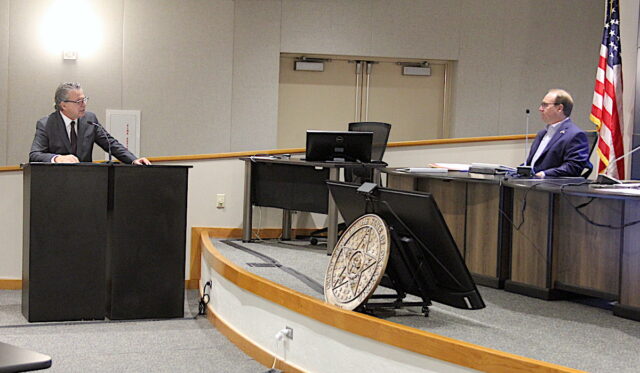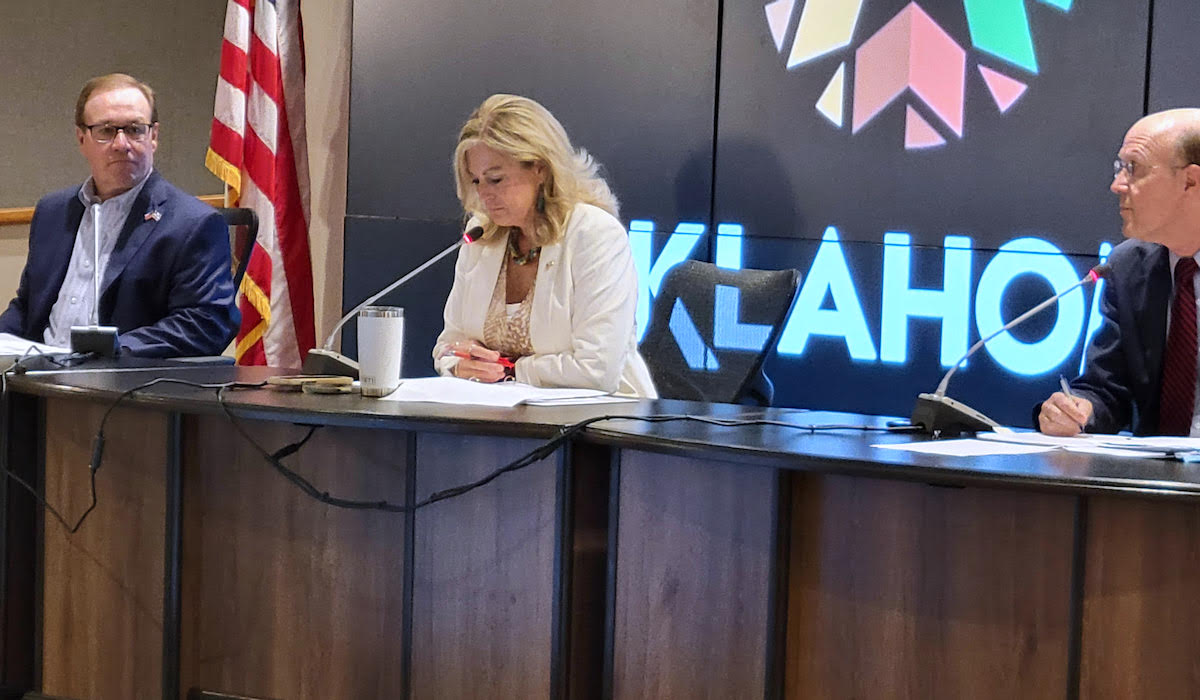

With offices in Oklahoma City and Tulsa, the law firm of Riggs Abney has been hired by the Oklahoma Corporation Commission to conduct an investigation into the behavior of Commissioner Todd Hiett, who allegedly got blackout drunk and groped an energy industry employee at a conference earlier this summer in Minneapolis.
But during Tuesday’s lengthy meeting of the three-member state regulatory body, Commissioner Bob Anthony scoffed at the arrangement, questioning whether any investigation arranged by OCC employees whose jobs depend on the commissioners could be called “independent.”
Instead of what was initially described as a confidential “personnel investigation,” Anthony proposed a thorough, open and transparent investigation. He invited four people familiar with the effects of abuse to speak to the commission about the trauma of being hurt by someone in power and the need for results of an investigation to be made public. All four called for Hiett, who last week resigned as chairman of the commission, to step down from the commission itself.
The victim of Hiett’s alleged sexual assault in June reportedly works for a regulated company that comes before Hiett and the rest of the Corporation Commission. Hiett has said he cannot recall the incident.
After last week’s meeting, a new report surfaced of improper and questionable conduct by Hiett. Nolan Clay of The Oklahoman reported allegations from two OCC employees that an intoxicated Hiett refused help from others after a party, instead driving his truck the wrong way down a street and running a stop sign in the process.
After Tuesday’s meeting, David told NonDoc she has heard other accounts of Hiett being drunk and acting inappropriately.
“People came up to me and told me,” said David, the commission’s new chairwoman. “There’s a difference between people gossiping and talking about it or somebody coming up and being an eyewitness. So it would be interesting to see who all comes forward, who feels comfortable coming forward (to talk with investigators).”
Pat Franz, general counsel for the OCC, told commissioners the agency could not find an available state certified Equal Employment Opportunity investigator and opted to contract with Riggs Abney to conduct an investigation because of its experience with employment law matters.
Wednesday morning, David responded to a question from NonDoc about whether she intended for Riggs Abney’s report on Hiett’s behavior to be made public or kept private by OCC.
“I would expect that the report will be released,” David said by text message, noting the report would not include names of potential witnesses or victims. “Because it’s an elected official, he is not protected under the Merit Protection Act.”
Criminal findings would be turned over to AG’s office
Franz said Riggs Abney attorneys in Oklahoma City have represented the OCC in several employment-related matters in the past. She said the agency received approval from the Office of Attorney General to hire the law firm, with Melvin Hall in the Oklahoma City office and Don Bingham in the Tulsa office designated as the attorneys conducting the investigation. They will be paid $300 an hour.
A letter from Hall (embedded below) to Franz said the investigation should not cost more than $25,000. If the cost does exceed that amount, the agency would seek permission from the AG’s office to execute another contract, said Trey Davis, chief public information officer for the OCC. There is no timeline on how long the investigation will last.
Employees will be notified by email about the investigation and how to contact investigators, Davis said. Hall and the OCC’s general counsel are developing that email which will be sent to all employees. In addition, information will be posted on the agency’s website.
“I would point out that our role is completed once the contract is in place and that notification goes out,” Davis told commissioners. “The agency itself will have no contact with the firm. They will be completely free to conduct their investigation as they see fit, and they will take it where it leads.”
David told fellow commissioners that the investigation’s focus is on personnel matters, but she said if investigators learn of issues that could be criminal in nature those findings will be turned over to Attorney General Gentner Drummond. Last week, Drummond’s chief of staff, Trebor Worthen, sent an email to David saying it was “ready to accept any complaint of criminal wrongdoing, and will take appropriate action.”
In the engagement letter, Hall said Riggs Abney’s primary investigative tool will be interviews and that all interviews will be strictly voluntary.
“The firm will maintain the confidentiality of those giving statements and will provide to the OCC an anonymized report of findings and recommendations,” Hall wrote. “If required, the firm will prepare to defend the OCC in related civil litigation. Any information obtained during the course of the investigation that involves behavior of a criminal nature will be referred to the investigator assigned to this matter at the Office of the Attorney General.”
David said she was “extremely satisfied” with Riggs Abney conducting the investigation.
“They’ve got a great reputation,” she said.
But Anthony proposed a different investigation that, among other things, would identify, examine and report who had any knowledge of alleged commissioner misconduct, while also looking into failures to report such instances.
Anthony called the parameters of the Abney Riggs investigation “ridiculous” and “a joke,” and he said investigators were being “blindfolded” with “their hands tied.” He said all allegations of misconduct and wrongdoing should be investigated, whether or not a formal complaint was filed.
David disagreed and did not allow Anthony’s motion for his version of the investigation to be considered.
“Some of the parameters that you put forward out there, it seems like you want to go after some of the employees, which would mean none of them would ever come forward,” she told Anthony. “I want to assure everyone that might be willing to come forward and on the scope of this where it says that he agrees to conduct the investigation, an independent investigation of commissioner misconduct, which means any commissioner impacting the commission, the employees or others who do business with the commission.”
After the meeting, David said she wanted to avoid any appearance of the commission going after employees who had knowledge about Hiett.
“That’s the last thing we want to do,” she said. “We want everybody to feel comfortable being able to come forward without any reprisal.”
‘The raging manifestos of one commissioner’

Anthony said the OCC is being unaccountable by not having an independent investigation whose results will be made public.
“Shamefully, it appears the OCC is continuing down the path of organized obstruction and coverup instead,” he said. “To let the commissioners or employees of this agency be involved with choosing the investigators is like letting one team hire the referee. The league chooses the referees — in this case, that should be un-conflicted leaders of the law enforcement community.”
Anthony then spoke bluntly about Hiett.
“The OCC does not need this investigation to determine how much Commissioner Hiett drank, with whom, how many people he groped, to whom he exposed himself, or where he passed out,” he said. “The OCC needs this investigation to ascertain the impact of commissioner misconduct on the credibility and legitimacy of this agency, its employees, the conduct of its business and the integrity of its operations — operations that have a multi-billion-dollar impact on this state every single year. To the extent that every incident of commissioner misconduct has its own consequences, then we need to know the details of each one. That said, they are individual pieces of a larger puzzle that must be assembled to be solved.”
Anthony and Hiett have clashed on different issues over the years, including Anthony’s claim that Hiett’s service on the board of Spirit Bank threatens “the very lawfulness of the commission process.”
In 2005, Hiett became the first Republican speaker of the Oklahoma House in 80 years but left office two years later when he could not seek reelection because of legislative term limits. In 2014, he won election to the Corporation Commission, which regulates electric and gas utilities in Oklahoma, as well as activities related to the petroleum industry and transportation services.
“As I stated at last week’s meeting, I’ve apologized for my abuse of alcohol, begun treatment, stepped aside as chairman of this commission, and will continue to cooperate fully with any ongoing personnel investigation being conducted, as the general counsel, Pat Franz, previously described,” Hiett said Tuesday. “As someone who has dedicated his life to public service, I firmly believe that an investigation — all investigations should be fair and follow the law, not be derailed by the raging manifestos of one commissioner with personal vendettas.
Hiett continued his criticism of Anthony, who has served as a commissioner since 1989.
“Sadly, this is not the first time that Commissioner Anthony has placed himself above the proper process of this commission, engaged in frivolous appeals of decisions that didn’t go his way, and sought to take down other elected officials when he disagrees with a legitimate outcome of an OCC proceeding,” Hiett said. “This commission has the tools it needs to construct and carry out proper, transparent and legal investigations. I regret — I’m truly sorry — we have to consume the public’s time on this because of my alcohol dependency in recent years. But the commission should take into account Commissioner Anthony’s long record of bitter and vengeful dissatisfaction while charting its pathway forward.”
During his long tenure, Anthony has seen the Oklahoma Corporation Commission contract with an outside firm for an investigation before. In 2011, the Fidelis Group was paid $7,937.50 to investigate “complaints by several OCC employees (principally female employees) regarding Joe Briley, Commissioner Bob Anthony’s aide.”
Briley retained his employment but died in 2018 during Anthony’s final reelection campaign. The Oklahoma Gazette detailed the report’s findings, which included a “lack of trust that has developed over time between Mr. Briley and the employees with whom he has contact.”
“Several employees stated that Mr. Briley is not sensitive to the personal space of fellow employees and often invades that space in an unwelcome manner,” Fidelis representatives wrote. “The employees interviewed generally did not view the invasion of personal space as being sexually motivated, but several female employees felt that Mr. Briley was more prone to behave in this fashion relative to female employees.”
Hiett told ‘redemption begins with resignation’
Anthony placed four items on Tuesday’s agenda dealing with the allegations against Hiett. He also invited four people to talk about their experiences with misconduct by people in authority, such as drunk driving and intimidating witnesses.
Jess Eddy, who publicly accused former University of Oklahoma President David Boren of sexual battery and predatory behavior in 2019, told commissioners that Boren’s sexual misconduct affected him in ways that caused him to flunk out of college, develop a drinking problem and experience depression.
“It wrecked my life,” Eddy said. “I was frustrated that one of our state’s highest officials could exist and work in this place where everybody who worked there knew exactly what was going on.”
OU hired a prominent law firm, Jones Day, to conduct investigations involving Boren as he stepped down as president in 2018. First, OU hired Jones Day to investigate the misreporting of donor financial data to U.S. News & World Report. Next, Jones Day was hired to investigate Boren’s alleged sexual misconduct.
More than 60 people were interviewed during that process, according to the university’s attorneys in a recent court hearing, and a four-page excerpt of the second Jones Day report provided to Eddy in May 2019 assessed his allegations as “generally credible.”
“Specifically, Jones Day confirmed that Mr. Eddy disclosed President Boren’s advances to two other witnesses, Employee IV and Senior Administrator XIV (his supervisor), prior to the start of the instant investigation,” Jones Day attorneys wrote. “Additionally, Mr. Eddy’s account of President Boren’s sexual advances is generally consistent with and similar to the accounts of others among The Six Witnesses — in particular the hotel room evenings described by SAIII and the President’s Office meetings described by SAXII. As such, Jones Day determined that Mr. Eddy provided generally reliable information during his second interview with respect to President Boren’s sexual conduct.”
While OU only provided Eddy with the four-page excerpt of the second Jones Day report, the university reportedly provided that entire report to Boren, a former governor and U.S. senator who was one of the most powerful people in Oklahoma for decades.
Despite those disclosures and provision of the reports to the Oklahoma State Bureau of Investigation, OU has refused to release the documents publicly, and university leaders and regents have barely discussed the findings of the second report or any recommended remedial actions over the years.
In June 2021, NonDoc filed litigation against OU, alleging violations of the Open Records Act and requesting an order that the Jones Day reports on alleged financial and sexual misconduct be released.
OU officials have said that “disclosure appears only to serve the public’s curiosity — not its interest,” and the university has argued that the Jones Day reports meet specific legal exemptions to the Open Records Act.
A hearing on OU’s motion for summary judgment in the lawsuit is set for 3 p.m. Wednesday, Aug. 28, in front of Cleveland County District Court Judge Michael Tupper, who read both Jones Day reports privately in his chambers July 10.
“To this day, it rests between my word and David Boren’s in the public eye,” Eddy told members of the Oklahoma Corporation Commission on Tuesday.
After discussing his frustrations with how OU has withheld its findings about Boren, Eddy called on Hiett to resign.
“I’m not here with a pitchfork. I’m not here to destroy another human life,” Eddy said, hinting at his own recovery process for substance abuse. “Right now, as a leader in the state of Oklahoma, what it looks like you’re willing to do is drag the state — numerous big levels of government — through this drama, and that shows me that the affliction common with alcoholism is, we all think we’re the most important person in the world, and I humbly suggest that the work of this commission, the people’s interests are more important than this, and this is something that you should do to set an example. Because when people do what you did, there should be consequences, and merely stepping down from the chairmanship is inadequate.”
Next, Anthony invited Christine Riley, of Eufaula, to speak. Her friend, Sheryl Bichsel, died after former Oklahoma House Rep. Dan Kirby crashed the motorcycle on which they were riding. Kirby’s toxicology report showed the presence of multiple intoxicants, and Kirby was recently sentenced to 41 months in federal prison after being convicted of involuntary manslaughter for Bichsel’s death.
In 2017, Kirby resigned from the Oklahoma House of Representatives while facing expulsion for allegations of sexual harassment at the State Capitol. He had represented House District 75 since 2008. In April 2021, Kirby won election to the Eufaula City Council. After he was indicted in February 2023, he resigned from that position.
“If he had been reprimanded when he was getting in trouble back when he was a state representative, would my friend still be here?” Riley asked. “I can’t play that guessing game, and nothing is going to bring my friend back.”
Riley said there has to be accountability for elected officials.
“Not all politicians are bad,” she said, “but (…) they all become drunk with power, and they all think they’re above the law. And you know what? Sometimes they are, and it’s not right.”
The Rev. Lori Walke, a senior minister at Mayflower Congregational United Church of Christ who is also a licensed attorney and a board member of the consumer advocacy group VOICE, took issue with Hiett for saying it would be a “detriment” for him to resign from the commission.
“It would be a detriment for you, for your ego and for your pride and for your personal power that you have accumulated over your many years in public office,” she said. “But for you to not step aside as a corporation commissioner would be a detriment to the good and fair-minded people of Oklahoma. For you to continue in this role is a detriment to the public’s trust in the commission’s ability to be unbiased, to balance without prejudice the interests of ratepayers to those of the utilities.”
Walke said that every decision Hiett makes on regulatory matters “will be overshadowed by the legitimate concern over your motivation.”
“Are you trying to keep someone quiet or smooth over the relationship with a utility whose employee has endured inappropriate behavior at your hand? Will citizens need to ask if drunkenness or moral turpitude are impacting the decisions of the Commission every single time there is an opportunity for public comment?” Walke asked. “Redemption begins with resignation. It is the honorable thing to do and perhaps the only way to build back trust so that you might lead in the future.”
Cameron Spradling, an OKC attorney who often represents sexual abuse victims and survivors, told commissioners they are exhibiting a “pattern” of behavior he has seen in other investigations. Spradling’s clients have included victims of a former Ninnekah coach sentenced to 40 years in prison and a former student who alleged a culture of hazing within the Kingfisher High School.
He described the pattern as one of coverup, starting with prior notice of misconduct, an internal investigation, failure to make the results of the investigation fully known to the public, and decisions not to report the behavior to outside law enforcement.
Spradling offered his services to Riggs Abney as a volunteer consultant. He also offered connections to private investigators who are retired FBI agents. He concluded by pleading with Hiett to resign.
“There is victory through surrender,” he said. “Resign, get serious treatment. Get inpatient, get outpatient treatment. Take care of yourself, get well.”




















